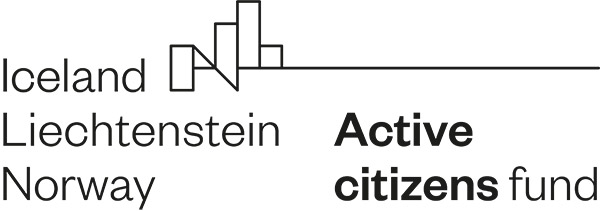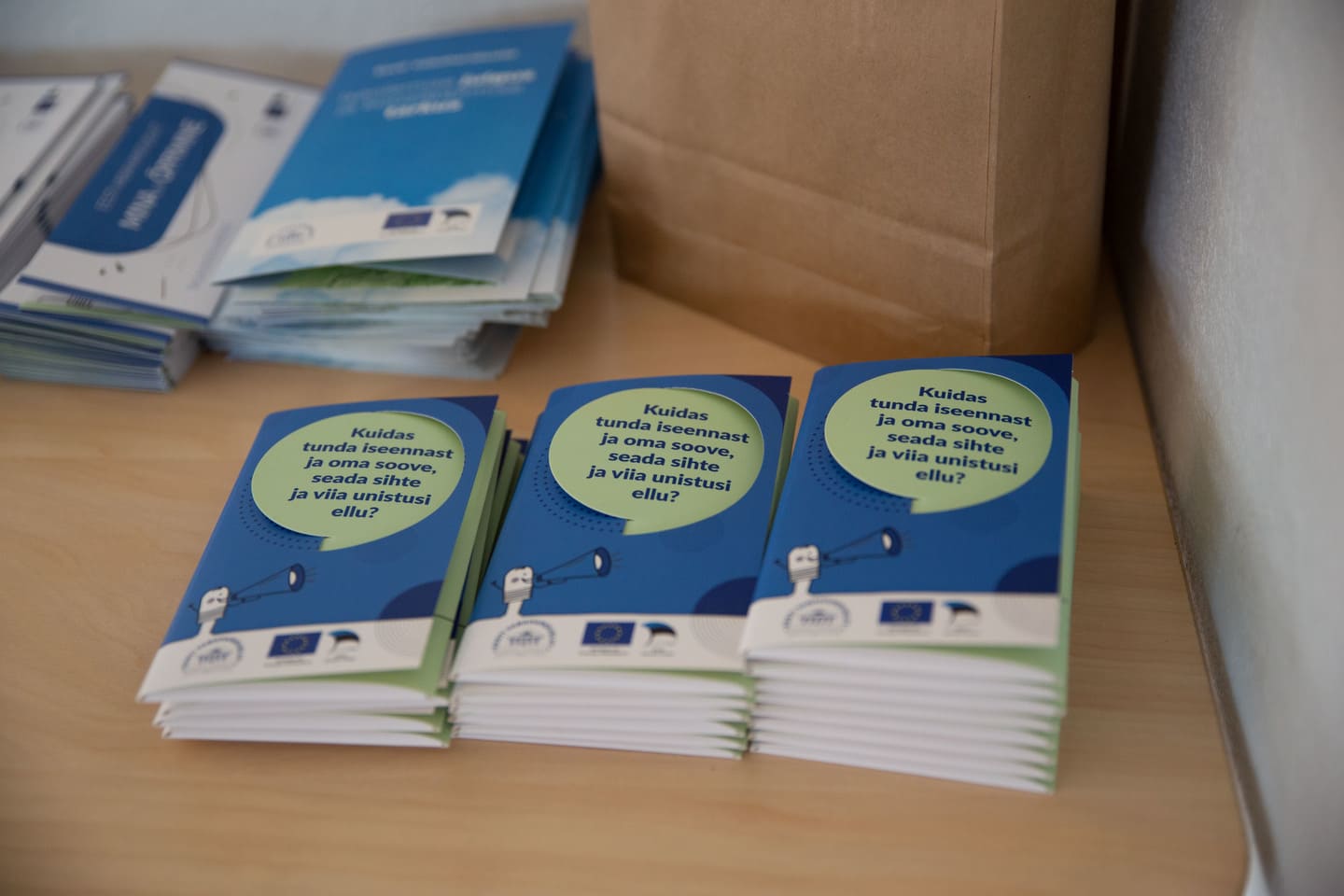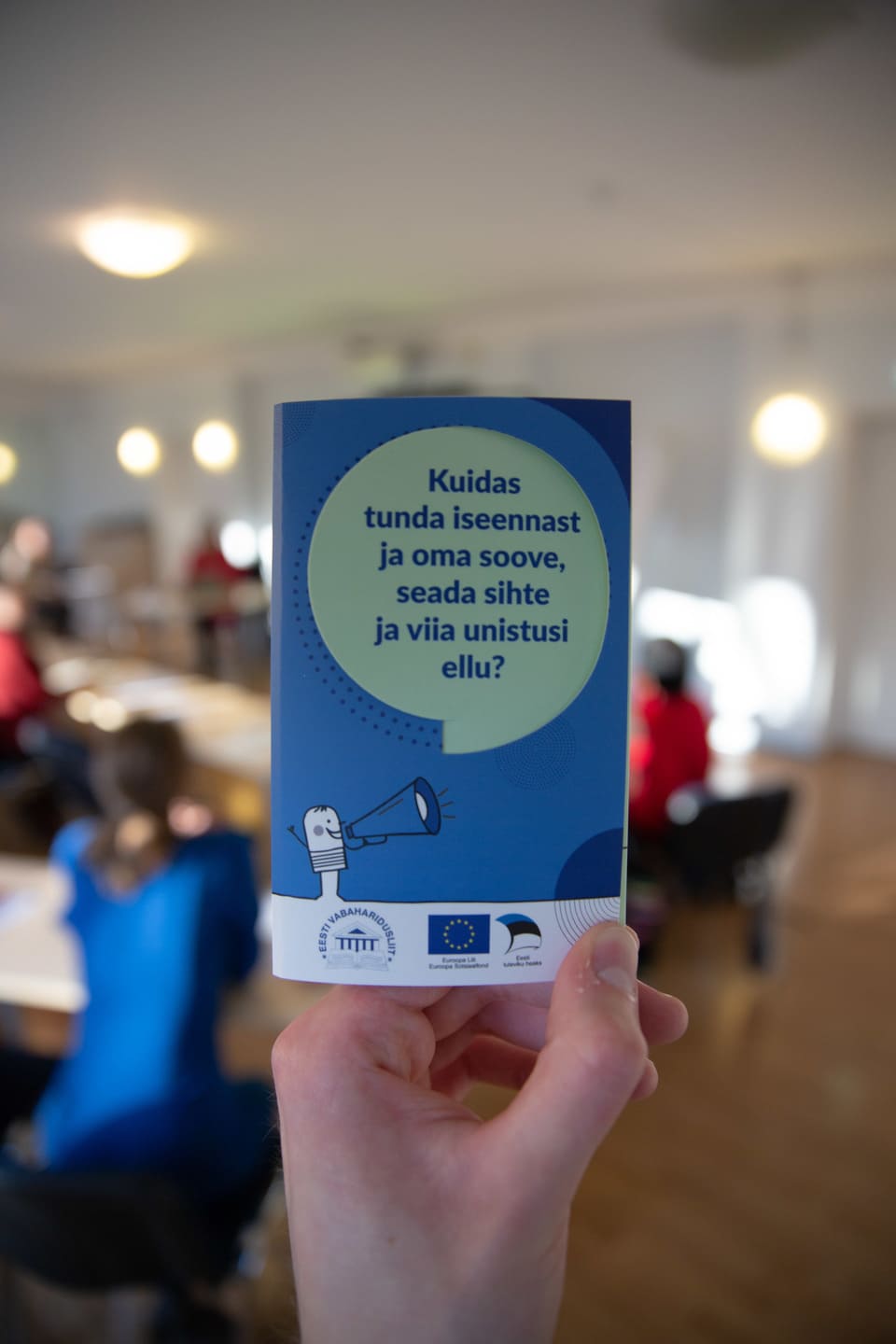Ongoing projects
Development of non-formal learning communication activities
Project period: 01.04.2020 – 31.03.2021
The project is funded by the EEA grants Active Citizens’ Fund, which is mediated by the Open Estonia Foundation in cooperation with the Network of Estonian Nonprofit Organizations.
Project manager Ena Drenkhan: ena.drenkhan@vabaharidus.ee
The ultimate goal of the project is to increase learners’ awareness of non-formal education and to make information more accessible to students. Training centers are able to carry out more effective communication activities and this is done in a coordinated way, on the basis of a single plan. Cooperation is also improving both between non-formal education training centers and with local governments and other regional stakeholders and organizations.
Direct results:
- the communication capacity of the members of the Estonian Association of Non-Formal Education and the members of the Association will be enhanced;
- the joint communication plan 2021-2025 of the Estonian Association of Non-formal Education and its members will be completed, which includes, among other things, instructions for involving learner with fewer opportunities in learning;
- we will carry out collecting and publishing stories of non-formal education training centers on the topic: “Stories count”.
Development of priority key competences 2018-2020
Project period: 01.09.2018 – 31.12.2020
Project no. 2014-2020.1.06.16-0062 – project manager Maire Loor, contact: maire.loor@vabaharidus.ee
 The main goal of the project is to involve adults with a lower level of education and less participation in education and to develop the competencies necessary for their life and work. As a result of the project, the awareness of adults about the need for learning and learning opportunities has increased, and the training offered in non-formal education training centers takes into account the needs of the target group and is of high quality.
The main goal of the project is to involve adults with a lower level of education and less participation in education and to develop the competencies necessary for their life and work. As a result of the project, the awareness of adults about the need for learning and learning opportunities has increased, and the training offered in non-formal education training centers takes into account the needs of the target group and is of high quality.
The training offered to participants in the project focuses on learning skills, foreign language skills, social skills and digital competences. The support activities planned are project seminars, experience counseling and training fairs.
Enhancing Learning Motivation – ELMO (2018-2020)
Project period: 01.11.2018 – 31.10.2020
The ELMO project is a project for sharing good practices and training trainers.
The lead partner of the project is Stephansstift Zentrum für Erwachsenenbildung gemeinnützige GmbH (ZEB) from Germany, other partners in addition to the Estonian Non-Formal Adult Education Association: Spanish Federation of Popular Universities / Federación Española de Universidades Populares (FEUP) from Spain, Association of the Leader of Adult Education Centers / Lietuvos suaugusiuju svietimo asociacija from Lithuania, Schools from Lovech regions / Сдружение „Знание“ Ловеч from Bulgaria and Narlıdere Public Training Center / Narlidere Oguzhan Ortaokulu from Turkey.
The trainings focus on the learners’ learning motivation, paying special attention to the role of emotions in the classroom. International cooperation allows for the exchange of different experiences and for looking beyond the traditional understanding of learning and teaching.
Project outcomes:
- three trainers’ trainings focusing on socio-emotional learning (SEL);
- a book of good practices for trainers.


International dimension in the trainer’s portfolio (2018-2020)
Project period: 01.06.2018 – 31.05.2020 (the period is being extended)
Erasmus + study mobility project, which is planned to involve 28 trainers, training managers and training organizers of non-formal education centers, who are responsible for the creation of the learning environment and quality of learning in the training center and who are related to education topics of adults with a lower level of education.
Two types of study trips are planned in the project:
- participation in training events in Belgium and Lithuania
- visiting training centers in Norway, Finland, Slovakia and Germany in terms of job shadowing
The project will cover the following costs related to the mobility: travel costs to and from the destination, accommodation costs, catering costs, travel insurance costs.
The first event of study mobility was participation in the Belgian conference “Transforming lives, society and adult education through outreach, empowerment and diversity”, a visit to the European Parliament and the Lifelong Learning Platform to learn how to design a motivating learning environment and how learning skills affect learning attitudes and how to develop learning skills, what is the role of the European Parliament in supporting adult education and what adult learning opportunities the Life Skills project offers.
In the summer of 2019, representatives of ENAEA members participated in the Baltic Summer School in Pasvalys, Lithuania, where the overarching topic was the role of emotions in adult learning.
In February 2020, study mobility will take place in Finland and in March 2020 in Norway.
Additional information: Ena Drenkhan, contact: ena.drenkhan@vabaharidus.ee.

A Step forward in Wellbeing in the field of Adult Education 2019 – 2021
Project period: 01.09.2019 – 31.08.2021
Erasmus + strategic cooperation development project.
The leading partner of the project is the Estonian Non-Formal Adult Education Association, other partners: European Center for Quality Ltd from Bulgaria, Enoros Consulting Ltd from Cyprus, Promimpresa SRL from Italy, Promozione Internazionale Sicilia Mondo from Italy, Fundacja Rozwoju Aktywnosci Miedzynarodowej I Edukacyjnej from Poland.
 The project focuses on ensuring a learning environment creating well-being in adult education. Well-being, in turn, is the basis for effective teaching and learning and the use of one’s potential.
The project focuses on ensuring a learning environment creating well-being in adult education. Well-being, in turn, is the basis for effective teaching and learning and the use of one’s potential.
The focus is on ensuring the well-being of learners, trainers and training providers and its link to the learning environment. A suitable learning environment plays a very important role for adults, and the same is true for educators who need a suitable environment for effective teaching. Training providers, who are often overlooked, must also feel good.
 In the first phase of the project, the needs of the target groups will be identified, the learning environment creating well-being will be defined, its eligibility criteria will be developed and the best practices of the partner countries will be mapped. In the second stage, training materials will be developed, and trainers will be trained, as well as instructional material on the learning environment creating well-being will be compiled. In the third phase, on-site training will be provided to training centers and trainers. Development activities are followed by the dissemination of results.
In the first phase of the project, the needs of the target groups will be identified, the learning environment creating well-being will be defined, its eligibility criteria will be developed and the best practices of the partner countries will be mapped. In the second stage, training materials will be developed, and trainers will be trained, as well as instructional material on the learning environment creating well-being will be compiled. In the third phase, on-site training will be provided to training centers and trainers. Development activities are followed by the dissemination of results.
Completed projects
Enterprising learner (2016-2019)
Project period: 01.11.2016 – 31.10.2019
European Social Fund project no. 2014-2020.1.06.16-0063. The project manager was Tuuli Pärg. The project ended on October 31, 2019.
From January 2017 to October 2019, 617 learners participated in 52 trainings in Harju County, Hiiumaa, Ida-Viru County, Jõgeva County, Järva County, Pärnu County, Saaremaa, Tartu County, Valga County and Võru County. The trainings developed learning skills, initiative, entrepreneurship, and social skills. In addition, seminars for the involvement of target groups and curriculum development took place.
Development of priority key competences (2016-2019)
Project period: 01.11.2016 – 30.04.2019
European Social Fund project no. 2014-2020.01.06.16-0047. Project manager Maire Loor. The project ended on October 30, 2019.
Within the framework of the project, the 28 partners of the Estonian Association of Non-Formal Education Association organized a total of 88 trainings in two years, with a total length of 3,039 academic hours of classroom work. The courses were attended by 1,059 adults, including 209 men and 850 women.
The trainings took place for the development of three key competences – foreign language skills, digital competencies, and social skills (personal development).
The 88 trainings that took place were as follows:
- Foreign language skills, incl. Estonian language skills of non-Estonian speaking adults – 46 trainings in the total amount of 1855 academic hours
- 26 digital competence trainings in the total amount of 720 academic hours
- 16 trainings of social skills (personal development) in the total amount of 464 academic hours.
5,500 flyers were compiled and printed and distributed to project partners. Both EVHL and the project partners distributed flyers to introduce the network and the project participants’ assessments of the trainings that took place in the project.
There were 14 training fairs and other events introducing the trainings of the training centers. Some project partners participated in the fairs together, others also invited other training providers in the area.
People who participated in the trainings shared their learning experiences to encourage and motivate other adults to learn. Such experiential counseling was provided at training fairs, on the premises of training centers, and also in places where people had come together for some other purpose (for example, in a craft circle or other hobby group).
Learning skills as a key to learning (2016-2019)
Project period: 01.11.2016 – 31.10.2019
European Social Fund project no. 2014-2020.01.06.16-0058. The project manager was Maire Sander. The project ended on October 31, 2019.
From January 2017 to October 2019, 583 learners participated in 42 trainings aimed at promoting adult learning and social skills. In addition, pilot trainings and experiential counseling took place.
Taking to the Top – Adult Educators on the Journey (TTop) (2016-2018)
The aim of the project was to increase the professionalism of adult educators in teaching key skills to different target groups.
As a result of the project, an outcome-based framework curriculum for the training of adult educators was completed, which was translated into English, German, French, Italian, Portuguese, Greek, Swedish and Estonian. In addition, training practices for adult educators were mapped and recommendations for the implementation of the framework curriculum were developed.
The project coordinator was ETKA Andras (Estonia) and in addition to the Estonian Association of Non-formal Education the partners were Aidlearn, Consultoria em Recursos Humanos Lda (Portugal), Global Learning & Skills Partnership (UK), Hälsingland Education Association (Sweden), Schweizerischer Verband für Weiterbildung (Switzerland), Thessaloniki Aristotle University (Greece).
Results:
- Mapping of the Practices in the Field of Adult Educators` Training – link: https://www.andras.ee/sites/default/files/TTOP%20-%20Intellectual%20Output%20O1A1_final .pdf
- Framework curriculum in Estonian, framework curriculum in English – link: https://www.andras.ee/sites/default/files/raamoppekava.pdf
- Recommendations for the Implementation of the CF Curriculum – link: https://www.andras.ee/sites/default/files/ttop_-_intellectual_output_io3_final_version.pdf
Estonian Non-Formal Adult Education Association as an organization protecting the interests of non-formal education
Project period 01.04 – 31.07.2019.
The project was supported by the Ministry of the Interior and the Civil Society Endowment.
The aim of the development leap preparatory project was to compile a development leap action plan as a co-creation of the members of the Estonian Association of Non-Formal Education, the action team and cooperation partners in order to enhance the activities of the Estonian Association of Non-Formal Education as an advocacy organization and strengthen the network.
Adult Literacies as Benefit for Inclusion and Equity – ALBIE (2016-2018)
The focus of the Erasmus + strategic cooperation project is on the ability of adult learners to apply what they have learned, based on the results of PIAAC in the partner countries.
Two surveys were conducted in the project, an international seminar for trainers, in which 6 trainers from Estonia participated, and an international seminar.
The project was coordinated by Mateja Bela University in Banska Bystrica (Slovakia), the project partners were the Krakow Pedagogical University, the training organization Youth Watch from Slovakia, the University of Reykjavik, and the Estonian Association of Non-formal Education.
You can read about the results of the project in the practice and policy recommendations “How to work with NEETs” (link:https://vabaharidus.ee/wp-content/uploads/2019/12/IO7-ALBIE-How-to-work-with-NEETs. pdf) and the project report “Adults Literacies as Benefit for Inclusion and Equity. Reports on young adults being NEETs: Estonia, Iceland, Poland and Slovakia“ (link: https://www.academia.edu/34922543/Adults_Literacies_as_Benefit_for_Inclusion_and_Equity_Reports_on_young_adults_being_NEETs_Estonia_Iceland_Poland_and_Slovakia).











